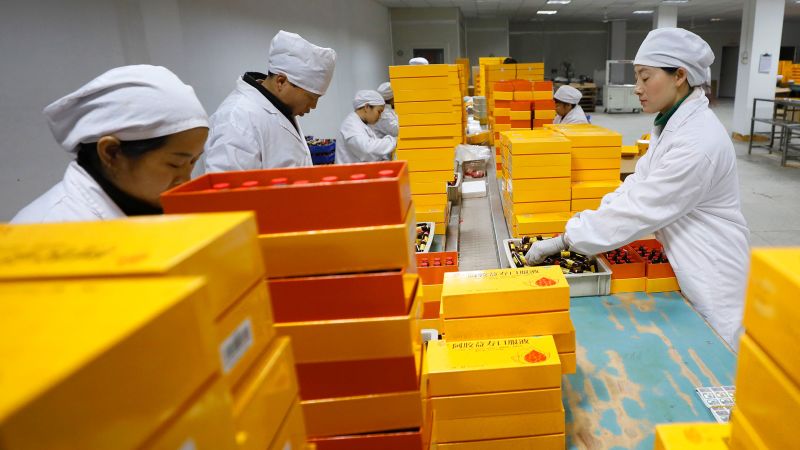In the United States, amoxicillin stands out as the most frequently prescribed antibiotic, used by tens of millions each year to combat bacterial infections. Whether for pneumonia, stomach ulcers, or strep throat, this medication serves an essential role in healthcare. However, it remains a lesser-known fact that only one manufacturer in the U.S. produces this critical drug, while a staggering 80% of its raw materials come from China. This dependency raises significant concerns, especially in light of ongoing trade tensions and the possibility of tariffs imposed by U.S. President Donald Trump on pharmaceutical imports.
Rick Jackson, the founder and CEO of Jackson Healthcare, which owns the only amoxicillin factory in the country, expressed worries regarding this reliance during an interview with CNN. He noted that potential trade hostilities could jeopardize access to amoxicillin and its raw materials, should China choose to leverage its supply chain dominance against the U.S. In this context, it is alarming to consider that China already supplies 96% of hydrocortisone, 90% of ibuprofen, and 73% of acetaminophen imported into the United States. Such statistics underscore a broader trend of reliance on Chinese pharmaceutical imports, raising red flags for national security.
Notably, experts emphasize that the escalating trade war between the U.S. and China has exposed vulnerabilities within the American pharmaceutical supply chain. The two nations embarked on a temporary truce after heightened tensions sparked by tariffs, but issues related to technological restrictions and trade dynamics persist. Within this climate of uncertainty, Leland Miller, commissioner at the U.S.-China Economic and Security Review Commission, has highlighted the crucial “chokepoints” China possesses over pharmaceutical supplies as a potential threat to American security and a form of influence on U.S. policy.
As the Biden administration investigates the pharmaceutical import landscape, it becomes increasingly clear that America’s reliance on China extends beyond individual medications. Generic drugs, which represent an astounding 90% of all prescriptions filled in the U.S., often derive their components from overseas, primarily China. Despite the understanding of this reliance, comprehensive data on the extent of dependency across the sector is scarce, as major pharmaceutical firms have little incentive to disclose such details.
Last April, President Trump initiated a probe into pharmaceutical imports to determine their implications for national security. However, it is known that China produces 80% of the global raw materials necessary for manufacturing amoxicillin. The situation underscores how vulnerable the U.S. could be to the fluctuations of Chinese economic policy, with Jackson stating that any disruption in the supply chain could be catastrophic, especially amid the emergence of a bacterial epidemic.
Jackson’s acquisition of a bankrupt amoxicillin facility in Bristol, Tennessee, in 2021 highlights attempts to bolster U.S. production. Known as USAntibiotics, the manufacturing site had once provided sufficient amoxicillin for the entire country but succumbed to overseas competition after the expiration of the amoxicillin patent in 2002. The facility’s revival speaks to a broader concern about America’s continued dependence on foreign pharmaceuticals, a sentiment echoed by the U.S.-China Economic and Security Review Commission as far back as 2019.
Despite the efforts to stabilize domestic pharmaceutical production, significant challenges persist. The pursuit of lower production costs has influenced drug manufacturers to shift operations from the U.S. to lower-cost countries like China and India. Consequently, China’s role as a predominant player in the global pharmaceutical supply chain has grown, largely due to its production of key starting materials (KSM) necessary for formulating active pharmaceutical ingredients (API).
China and India jointly account for 82% of API filings with the U.S. Food and Drug Administration, with China’s market share increasing significantly in recent years. As Beijing implemented policies fostering growth in the pharmaceutical sector, China’s competitiveness increased, leading to the emergence of industry clusters that lower costs while ensuring quality. This trend has only been amplified by the stricter environmental regulations in the U.S. and European Union, which have further shifted production to China, where regulations are often more lenient.
The interactive dynamics between India and China also illustrate a broader paradigm. India, while being the largest supplier of generics globally, relies on China for about 70% of its API imports. This reliance reflects the natural evolution of both industries, as Indian firms focus on high-margin products, leaving the bulk of cheaper API supply to Chinese manufacturers.
As U.S. policymakers grapple with these interconnected challenges, they must consider not only the immediate implications of tariffs but also the potential long-term consequences for domestic health care. Tariffs on pharmaceuticals could lead to higher costs for patients, widening health disparities in a system already facing significant pressures. Research has indicated that a 25% tariff could escalate costs of imported pharmaceuticals by tens of billions annually, ultimately affecting those who are most vulnerable.
Ultimately, the fragility of the American pharmaceutical supply chain necessitates a reevaluation of current strategies. Experts argue that instead of relying solely on punitive tariffs,



